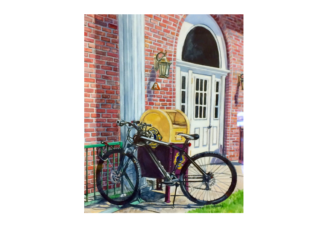
NEW JERSEY—Gov. Phil Murphy has signed a law to increase statewide minimum funding levels for organizations in the areas of arts, culture, history, and tourism areas by more than $9 million for the fiscal year beginning July 1.
The move was praised by arts organizations as a much-needed boost to the state’s long-underfunded “creative industries” that boost New Jersey’s quality of life.
“Thank you for signing A3101 into law. Your statement on the bill is a clear signal that you recognize how important arts, history, and tourism are to New Jersey’s economy and quality of life,” said ArtPride New Jersey, a statewide arts advocacy organization following the law’s approval, in a letter to Murphy.
The bill was unanimously approved in the Assembly and Senate before moving on to the governor’s desk. He signed it on the last day of the 2019 legislative session.
“We are grateful for the Legislature’s desire to reprioritize funding for arts, historical heritage, and tourism programs because they stimulate business activity, contribute to New Jersey’s innovation economy, and instill great pride in our state. We are as grateful to you for agreeing with our legislators, signing (A3101/S247) into law, and restoring minimum appropriations to 2005 levels of support,” said ArtPride New Jersey.
The new law increases the minimum annual funding for arts, cultural, historic and tourism efforts, which will be appropriated from the state’s hotel-motel occupancy tax at 2005 levels, which equates to a more than $9 million increase.
An ArtPride NJ graphic notes funding levels will increase from $16 million to $22.68 million for the state Council on the Arts; from $2.7 million to $3.84 million for the state Historical Commission; from $9 million to $11 million for the state Division of Travel & Tourism; and from $500,000 to $720,000 for New Jersey Cultural Trust.
Accompanying the bill’s signing, Murphy issued a statement praising the Legislature’s support for increased funding but also calling the new law’s funding levels “aspirational” due to “years of poor fiscal management.”
Efforts to clarify his use of “aspirational” referring to new minimum funding levels were not returned by press time.
“Today I am pleased to sign Senate Bill No. 3101, which increases the statutory dedication for arts and cultural projects, historical heritage programs, and tourism advertisement and promotion from hotel and motel occupancy fees collected by the state,” said Gov. Murphy’s statement following the bill’s signing.
“The statutory dedication funds grants to arts organizations, projects, and artists throughout the state, as well as grants to museums, historical societies, and historic sites and grants for research and publications on New Jersey history. It also supports the state’s robust tourism industry,” added Murphy.
‘Cultivate imaginations’
“I am signing this bill because I strongly believe that the arts cultivate young imaginations, create a welcoming sense of place and desirable quality of life, and stimulate business activity,” Murphy said.
“I recognize, however, that the funding thresholds established in the bill represent a nearly $30 million increase over Fiscal Year 2020 appropriations and are merely aspirational while we continue the hard work of correcting years of poor fiscal management and decision-making. Still, I am hopeful that the changes made through this legislation will begin to end the practice of prior administrations and legislatures chronically underfunding the State’s cherished cultural programs,” Murphy said.
One of the law’s sponsors, Bruce Land (D-Atlantic), said the increased dollars go to support a wide variety of arts enterprises.
“For the painters, the poets, the musicians, and thespians who have built their careers on the New Jersey arts scene, making sure we support their work through grants, awards and funds specifically dedicated for this purpose is crucial to ensuring arts and culture continue to thrive for years to come,” said Land.
More for Bergen County?
Bergen County’s Division of Cultural and Historic Affairs Director Cynthia Forster said she was glad to hear the legislation to increase state arts and cultural funding was signed into law.
Asked whether she expected to receive additional funds for countywide arts programming in the 2021 calendar year (starting July 1, 2020) she said she hopes that happens.
“That is the unknown. I would not want to make any assumptions at all right now. It’s up to the State Council on the Arts and their board to make those determinations,” said Forster.
She said in 2019 that about $158,000 was requested by 34 organizations but the county only received $106,000 to be distributed from the state Council on the Arts.
“Maybe we could give them [grant applicants] what they actually asked for [with increased state funds],” she said.
Forster said that the 34 organizations partially funded in 2019 rely on county grant funds to fund basic operations and survive.
She said grants are awarded based on many factors, including quality of grant application, value of in-kind donations and services, and what level of funding the county has to distribute to organizations applying.
“This funding is allowing them to do new projects that they might not otherwise be able to do,” she added. Calls to the state Council on the Arts to determine possible 2021 funding priorities were not returned.
Another bill (A-3832) that allows municipalities to impose an additional property tax levy to support arts and cultural programming was signed by Murphy Jan. 13.
The bill permits a town to hold a referendum on whether such a local tax should be imposed.
If a majority of voters agree to establish a new levy—usually a penny or so per $100 of assessed home and land value—then a new tax would be levied in the next budget year. For example, if a one-penny tax was levied on a home assessed at $400,000, that would equal an extra $40 yearly.
Funds would be deposited in a local trust earmarked for such tax dollars; the new local taxing authority would be similar to trusts established by towns to save and preserve open space, said the sponsors.
The new local taxing authority received support from the state League of Municipalities and arts groups, but was scored as another unnecessary tax increase by many Republican legislators, who stressed New Jersey currently has the nation’s highest property tax bills, which in 2018 averaged $8,767 statewide.
Although it received unanimous support from the Assembly and Senate during the last voting session, a bill to allow small theaters of 50 seats or more to apply for a liquor license, a “theater license,” was not signed.
The bill (A-1478; S-1648), sponsored by Assemblywomen Valerie Vainieri Huttle (D-37) and Annette Chaparro (D-Hudson), was intended to help local theaters better compete with larger venues by offering patrons an opportunity to apply to towns for a special plenary retail consumption license. Currently, only theaters able to seat 1,000 or more could apply for a “theater license” to serve liquor.



